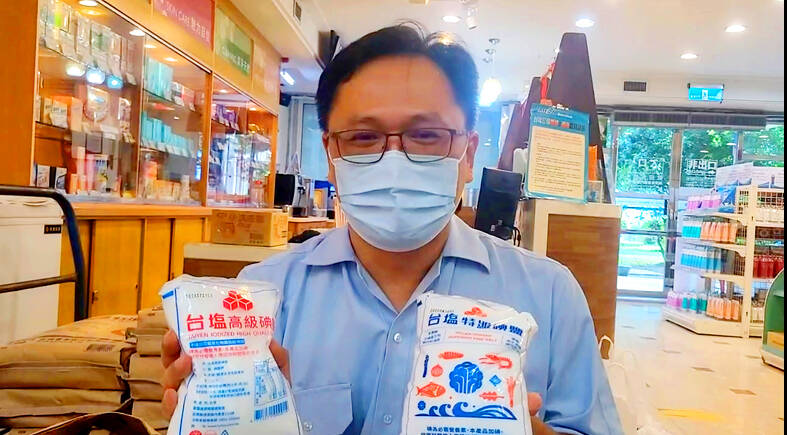The nation’s largest salt producer has said that it has sufficient stock to meet local demand, while local authorities said that programs are in place to regularly monitor food safety amid concern over the impact of Japan’s discharge of treated wastewater from its decomissioned Fukushima Dai-ichi nuclear power plant.
Recent news reports said people in some cities were snatching up salt products in supermarkets, especially Taiyen Biotech Co’s (台鹽) “iodized high quality salt.” Reporters checked out several Carrefour and Pxmart stores and found that some outlets had run out of Taiyen salt, while store employees confirmed that people had been snatching up 1kg bags of salt.
When asked, customers told reporters that they were stocking up on salt to avoid buying or digesting “salt from Japan, which might have radioactive contamination.”

Photo: Tsai Cheng-min, Taipei Times
A popular belief that iodized salt can protect against radiation has also sparked salt buying sprees in South Korea and China in the past few days.
Executives at Taiyen, formerly a state-controlled enterprise known as Taiwan Salt Co, told reporters that all of the company’s products were produced before Japan on Thursday last week began releasing treated wastewater from the Fukishima plant into the sea.
The Atomic Energy Council said that programs are in place to continue monitoring radiation levels around Taiwan’s waters, and so far, testing results indicated that all radioactive indicators were within normal levels.
The council’s Institute of Nuclear Energy Research’s radiation laboratory has also been testing samples of food products for possible radiation contamination, but none have shown abnormal levels of iodine, cesium, strontium, tritium or other radioactive elements, government officials said.
Scientists at Tunghai University’s applied physics department have posted on social media to allay public concerns about radiation contamination.
Taiwan’s standard for water content in “high quality salt” is set at below 0.5 percent, and at below 3 percent for regular quality salt, while the WHO sets the limit for tritium in water at 10,000 becquerels per liter.
“As people are recommended to drink two liters of water each day, each person would have to consume 444kg of salt made from tritium-containing wastewater discharge from the Fukushima nuclear power plant to exceed the WHO’s limits,” the scientists wrote.
Taiyen also released a statement saying that it had distributed extra stocks of salt at the end of last month in anticipation of high demand during Ghost Month — which falls on Aug. 16 to Sept. 14 this year — so all major sales channels and retailers should have sufficient supply.
“Taiwan’s domestic demand for refined salt is about 100,000 tonnes each year. Our plant — Tung-Hsiao Electrodialysis Refined Salt Factory in Miaoli County — was the main production site and when it was still a state enterprise, had an annual capacity of 100,000 tonnes,” it said.
“After the firm was privatized in 1995 and opened to market competition, annual output dropped to about 70,000 tonnes. However, it can boost production when needed. As such, salt supply remains normal and the public can be assured of quality products,” it said.
Additional reporting by Jason Pan

Chinese Nationalist Party (KMT) Chairman Eric Chu (朱立倫), spokeswoman Yang Chih-yu (楊智伃) and Legislator Hsieh Lung-chieh (謝龍介) would be summoned by police for questioning for leading an illegal assembly on Thursday evening last week, Minister of the Interior Liu Shyh-fang (劉世芳) said today. The three KMT officials led an assembly outside the Taipei City Prosecutors’ Office, a restricted area where public assembly is not allowed, protesting the questioning of several KMT staff and searches of KMT headquarters and offices in a recall petition forgery case. Chu, Yang and Hsieh are all suspected of contravening the Assembly and Parade Act (集會遊行法) by holding

PRAISE: Japanese visitor Takashi Kubota said the Taiwanese temple architecture images showcased in the AI Art Gallery were the most impressive displays he saw Taiwan does not have an official pavilion at the World Expo in Osaka, Japan, because of its diplomatic predicament, but the government-backed Tech World pavilion is drawing interest with its unique recreations of works by Taiwanese artists. The pavilion features an artificial intelligence (AI)-based art gallery showcasing works of famous Taiwanese artists from the Japanese colonial period using innovative technologies. Among its main simulated displays are Eastern gouache paintings by Chen Chin (陳進), Lin Yu-shan (林玉山) and Kuo Hsueh-hu (郭雪湖), who were the three young Taiwanese painters selected for the East Asian Painting exhibition in 1927. Gouache is a water-based

Taiwan would welcome the return of Honduras as a diplomatic ally if its next president decides to make such a move, Minister of Foreign Affairs Lin Chia-lung (林佳龍) said yesterday. “Of course, we would welcome Honduras if they want to restore diplomatic ties with Taiwan after their elections,” Lin said at a meeting of the legislature’s Foreign Affairs and National Defense Committee, when asked to comment on statements made by two of the three Honduran presidential candidates during the presidential campaign in the Central American country. Taiwan is paying close attention to the region as a whole in the wake of a

OFF-TARGET: More than 30,000 participants were expected to take part in the Games next month, but only 6,550 foreign and 19,400 Taiwanese athletes have registered Taipei city councilors yesterday blasted the organizers of next month’s World Masters Games over sudden timetable and venue changes, which they said have caused thousands of participants to back out of the international sporting event, among other organizational issues. They also cited visa delays and political interference by China as reasons many foreign athletes are requesting refunds for the event, to be held from May 17 to 30. Jointly organized by the Taipei and New Taipei City governments, the games have been rocked by numerous controversies since preparations began in 2020. Taipei City Councilor Lin Yen-feng (林延鳳) said yesterday that new measures by